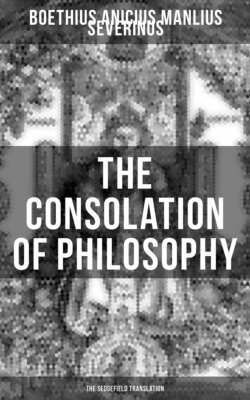Читать книгу THE CONSOLATION OF PHILOSOPHY (The Sedgefield Translation) - Anicius Manlius Severinus Boethius - Страница 15
На сайте Литреса книга снята с продажи.
XIII
ОглавлениеTable of Contents
Having sung this lay, Philosophy, that is, Reason, took up once more her argument, and spake on this wise: ‘Methinks that we may now speak in more searching and darker words, for I perceive that my teaching is in some measure penetrating thy mind, and thou understandest well enough what I say to thee. Consider, therefore, how much of all these worldly possessions and riches is thine own, and which of them when closely considered cannot be replaced? What profit hast thou from the gifts that Fate, as thou sayest, giveth thee, and from wealth, even if they last for ever? Tell me, is it thou that givest value to thy wealth, or is it valuable in its own nature? No matter, I tell thee that it is so by its own nature, not by thine. If so, how art thou in any respect the better for that wherein it is good? Tell me now what thou accountest most precious; is it gold, or what is it? Gold, I doubt not. But though this be at present good and valuable, yet he is more delightful and beloved that bestows it than he that hoards it and takes it from others. Likewise wealth is more popular and delightful when given away than when hoarded and kept. Now, covetousness makes the covetous hateful both to God and to man, while virtue makes its possessor beloved, praised, and respected of God, and of those men who cherish it. Since the same thing cannot be his that giveth it and his to whom it is given, therefore it is better and more precious when given than when withheld. If then all the riches of this world were to fall into the hands of one man, would not all other men be poor? Surely good report and good esteem are for every man better and more precious than any wealth; for behold, the report filleth the ears of all who hear it, yet he who speaketh it suffereth no loss. It revealeth the secrets of his own heart and passeth into the recesses of that of his hearer, and on the journey between them it groweth not less; no man can slay it with the sword, nor bind it with cords, and it never dieth. But of your riches, though they be ever with you, ye have never sufficient, and, though ye give them to other man, ye cannot any the more satisfy their poverty and their greed. Though thou divide them fine as dust, thou canst not satisfy all men alike with them, and when thou hast divided them thou remainest poor thyself. The riches of this world are paltry things, as no man can have enough of them, nor be enriched by them, without making some other man poor. Tell me, does the beauty of gems attract your eyes to marvel at them? Surely, I know it does. Now this quality of beauty in them is theirs, and not yours. Therefore I am greatly astonished how ye men think the beautiful substance of such senseless things better than your own good qualities, and how ye can admire gems or any other perishable thing that hath not sense; for on no grounds can they deserve your admiration. Though they are God’s creatures, yet they not to be compared with you, for a thing is either not good compared with you, or at any rate of small excellence. We debase ourselves too much when we love what is subject to us more than we love ourselves, or the Lord who created us and gave us all good things. Now, does it please thee to behold a fair country-side?’
